| Elaborator Reflection allows user to write meta-programs. These are programs which generate programs. |
 |
| Idris uses a 'proof-theory-like' tactics language to convert Idris programs into a simpler type-theory known as TT syntax. |
 |
Elaborator reflection allows this language to convert meta programs written by users into TT syntax.
For an embedded language example see this page.
TT syntax
Terms,
t ::= c (constant)
| x (variable)
| b.t (binding)
| t t (application)
| T (type constructor)
| D (data constructor)
Binders,
b::= λ x:t (abstraction)
| let x->t :t (let binding)
| x :t (function space)
Constants,
c::= Typei (type universes)
| i (integer literal)
| str (string literal)
x :t (function space)
Constants,
c::= Typei (type universes)
| i (integer literal)
| str (string literal)
Vector Addition Example
This is an example, from the paper of how Idris is elaborated into TT.
Tactics
Forward Deduction
We sometimes think of a deduction rule as starting from a set of things we know (premises) and leading to something we wish to prove (conclusion). |
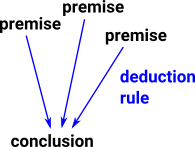 |
Backward Deduction (Tactics)
When we are using a tactics system we start with what we want to prove (conclusion) and we go back to all the things we have to prove for that to be true (the premises). |
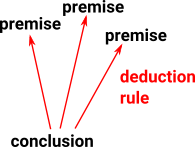 |
So in a tactics system we start with a goal (conclusion), then we reduce this to a set of sub-goals and so on.
Proof Tree
The proof tree can hold the tree of goals and sub-goals encoded as proof objects.
The complete proof tree can hold a theorem (or by Curry-Howard a program).
In proof assistants the proof tree is constructed, from an incomplete tree, by filling in the holes (unknown terms).
The nodes can be encoded as λ-terms or a collection of tactic calls. However λ-terms are not very good at holding holes (open terms) because they require extra (outside proof) information. |
 |
Proof Monad
Add monadic structure to proof object to allow exra information to be held for holes. |
|
https://github.com/idris-lang/Idris-dev/blob/master/libs/prelude/Language/Reflection/Elab.idr
A tactic is impemented by a function
TT -> List (TTName, TT) -> Tactic
where
- The first argument is the goal type,
- The second is the local proof context,
- The return result
Proof State
A proof state is a tuple (see Brady 2013) consisting of the following:
- A global context, C, containing pattern matching definitions and their types.
- A local context, Δ, containing pattern bindings.
- A proof term, e, in TTdev
- Unsolved unification problems, P
- These take the form ( Γ,e1,e2), i.e. the context in which the problem is to be solved, and the expressions to be unified.
- A hole queue, Q.
Identity Proof
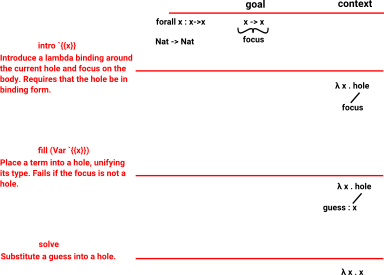
see here
Idris Top Level
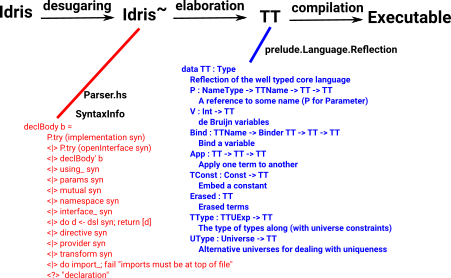
Elab Monad
The Elab monad holds a proof state inside, which has:
- A goal type
- A proof term that is incrementally built up.
- A hole queue
- A collection of open unification problems
- A supply of fresh names
The following is Idris code from module Language.Reflection.Elab which is in libs->prelude.
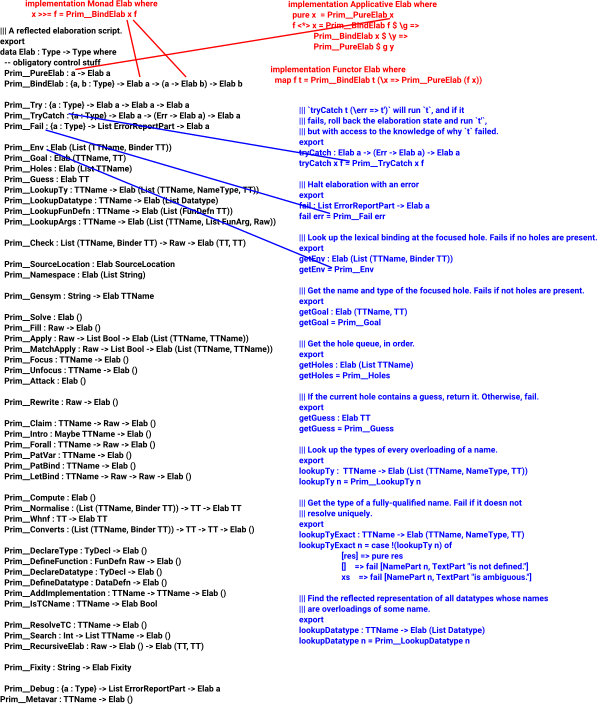
The state is really held in the Haskell code.
see
Module : Idris.Elab.Term
Description : Code to elaborate terms. |
-- | Do a step in the reflected elaborator monad. The input is the
-- step, the output is the (reflected) term returned.
runTacTm :: Term -> ElabD Term
runTacTm tac@(unApply -> (P _ n _, args))
| n == tacN "Prim__Solve"
= do ~[] <- tacTmArgs 0 tac args -- patterns are irrefutable
-- because `tacTmArgs` returns lists of exactly the size
-- given to it as first argument
solve
returnUnit
| n == tacN "Prim__Goal"
= do ~[] <- tacTmArgs 0 tac args
hs <- get_holes
<snip>
|
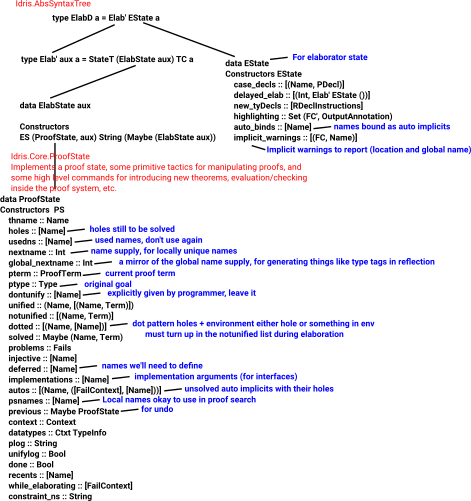
Elaborator Code
| Running elaborator from within Idris environment: |
idNat : Nat -> Nat
idNat = %runElab (do intro `{{x}}
fill (Var `{{x}})
solve) |
This uses the %runElab e declaration.
'e' has the type Elab ()
It adds:
- new type declation function
- data type definitions
generated by the Elab action generated by e to the context.
Haskell Code:

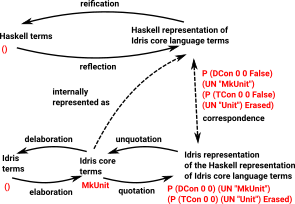

https://koerbitz.me/posts/A-Look-at-the-Idris-Internals-Part-I-Overview-and-Parsing.html


Idris> :browse Language.Reflection.Elab.Tactics
Namespaces:
Names:
addImplementation : TTName -> TTName -> Elab ()
apply : Raw -> List Bool -> Elab (List TTName)
attack : Elab ()
check : List (TTName, Binder TT) -> Raw -> Elab (TT, TT)
claim : TTName -> Raw -> Elab ()
compute : Elab ()
converts : TT -> TT -> Elab ()
convertsInEnv : List (TTName, Binder TT) -> TT -> TT -> Elab ()
currentNamespace : Elab (List String)
debug : Elab a
debugMessage : List ErrorReportPart -> Elab a
declareDatatype : TyDecl -> Elab ()
declareType : TyDecl -> Elab ()
defineDatatype : DataDefn -> Elab ()
defineFunction : FunDefn Raw -> Elab ()
fail : List ErrorReportPart -> Elab a
fill : Raw -> Elab ()
focus : TTName -> Elab ()
forall : TTName -> Raw -> Elab ()
gensym : String -> Elab TTName
getEnv : Elab (List (TTName, Binder TT))
getGoal : Elab (TTName, TT)
getGuess : Elab TT
getHoles : Elab (List TTName)
getSourceLocation : Elab SourceLocation
intro : TTName -> Elab ()
intro' : Elab ()
isTCName : TTName -> Elab Bool
letbind : TTName -> Raw -> Raw -> Elab ()
lookupArgs : TTName -> Elab (List (TTName, List FunArg, Raw))
lookupArgsExact : TTName -> Elab (TTName, List FunArg, Raw)
lookupDatatype : TTName -> Elab (List Datatype)
lookupDatatypeExact : TTName -> Elab Datatype
lookupFunDefn : TTName -> Elab (List (FunDefn TT))
lookupFunDefnExact : TTName -> Elab (FunDefn TT)
lookupTy : TTName -> Elab (List (TTName, NameType, TT))
lookupTyExact : TTName -> Elab (TTName, NameType, TT)
matchApply : Raw -> List Bool -> Elab (List TTName)
metavar : TTName -> Elab ()
normalise : List (TTName, Binder TT) -> TT -> Elab TT
operatorFixity : String -> Elab Fixity
patbind : TTName -> Elab ()
patvar : TTName -> Elab ()
resolveTC : TTName -> Elab ()
rewriteWith : Raw -> Elab ()
runElab : Raw -> Elab () -> Elab (TT, TT)
search : Elab ()
search' : Int -> List TTName -> Elab ()
solve : Elab ()
sourceLocation : Elab ()
unfocus : TTName -> Elab ()
whnf : TT -> Elab TT
Idris> |
x :t (function space) Constants, c::= Typei (type universes) | i (integer literal) | str (string literal)












